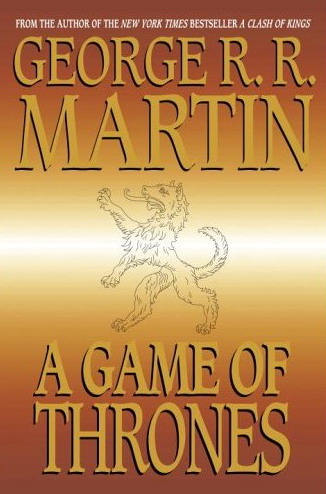 Almost twenty years have passed since the fall of the Targaryen dynasty–twenty years since the last of the dragons was seen in the Land of the Seven Kingdoms. Now, the libertine Robert Baratheon sits on the Iron Throne, blind to the conspiracies and secret combinations that surround him.
Almost twenty years have passed since the fall of the Targaryen dynasty–twenty years since the last of the dragons was seen in the Land of the Seven Kingdoms. Now, the libertine Robert Baratheon sits on the Iron Throne, blind to the conspiracies and secret combinations that surround him.
In this dangerous time, Ser Jon Arryn, the King’s Hand, dies of mysterious causes. Most of the realm accepts the official story that the death was natural, but when Arryn’s wife Lysa sends a letter to her sister, Catelyn and her husband Ser Eddard Stark immediately suspect that the death was orchestrated by the Lannisters. Only one thing remains: to travel to King’s Landing and uncover the proof. Soon, King Robert calls on Ser Eddard to become his new Hand, giving them the perfect opportunity to do this.
Little does Ser Eddard know, the intrigue goes much deeper than any of them realize. For the Lannisters are gathering an army, and Queen Cersei and her brother, Ser Jaime, harbor a secret that would tear the realm apart. Meanwhile, the last of the Targaryens bears a child prophesied to rule the world, while far to the North, an ancient evil bides its time, waiting to sweep the seven kingdoms with horror the likes of which has not been seen in a thousand years.
Winter is coming–and the people of the Seven Kingdoms are ill prepared to face it.
Everyone seems to be talking about George R. R. Martin’s Song of Ice and Fire series these days–next to The Wheel of Time, it’s probably the biggest epic fantasy line of the last ten or fifteen years. Martin is well known for killing off his characters and writing in shades of gray, so I thought it would be good to give this series a try.
As soon as I picked up the book, I was hooked. Martin knows how to craft a beautiful, engrossing fantasy world. In order to leave no doubt on that point, observe:
Yeah, that pretty much sums up what Martin did with his Land of the Seven Kingdoms. It’s an awesome fantasy world, and I found myself lost in it from the first page.
I must admit, however, after hearing so much about the Song of Ice and Fire series, I was surprised at how few characters died in this book. That’s not to say everyone survived–in fact, Martin killed my favorite character, which made me feel HORRIBLE–but I was expecting there to be more. However, this is the first book in the series, so I assume that the really crazy stuff happens later.
While overall I loved A Game of Thrones, I admit I did have a few misgivings about the book. Martin really does write in shades of gray, and while that makes the story unpredictable and surprising, it also makes things very dark and austere. Martin seems to have no interest in redeeming his characters, and when any of them try to be noble, he cuts them down at every turn.
Personally, I don’t care for that. Flawed characters may be more relateable, but seriously flawed characters (or characters with no interest in overcoming their flaws) turn me off. In this way, Martin is practically the antithesis of David Gemmell; whereas Gemmell makes you love his characters despite their flaws, Martin keeps you reading in spite of the fact that you hate all his characters.
How does he do it? By creating a beautiful, wondrous world. By crafting a masterful story full of intricate twists and turns. By making you hate some of the characters so #%$^! much that you have to stick around and see how they die. It’s all entertaining and extremely engrossing, but at the end of it all, I didn’t come away with any real love for Martin’s characters–except perhaps for a couple of Eddard’s kids, who are still young enough to be somewhat innocent.
I suppose it’s all a part of this new non-conciliatory movement in fantasy. Don’t get me wrong; A Game of Thrones is an EXCELLENT book, but it’s very…non-conciliatory. If that’s your thing, more power to you, but I personally prefer stories about redemption, where romance still lives and even the most unlikely character can be a True Hero, if only for a few fleeting, glorious moments.
I’ve always wondered if I should pick up this book. Interestingly, you described the exact reason that I wouldn’t want to read a book–no tale of redemption and little regard for characters who try to do the right thing.
To follow Martin’s contrast of fantasy versus real, I would say “real life is being nice to your family at Christmas despite their annoying tendency to misquote movies; fantasy is Samwise Gamgee carrying Frodo up the flaming slopes of Mordor to destroy the ring of corruption and power or Elend Venture struggling between being an emperor and being the leader of his people in the face of a god-like menace to the world.” Tales of human strength and redemption can be amazingly inspiring in a fantasy world; tales of flawed people being flawed and gritty and that’s it? No thanks.